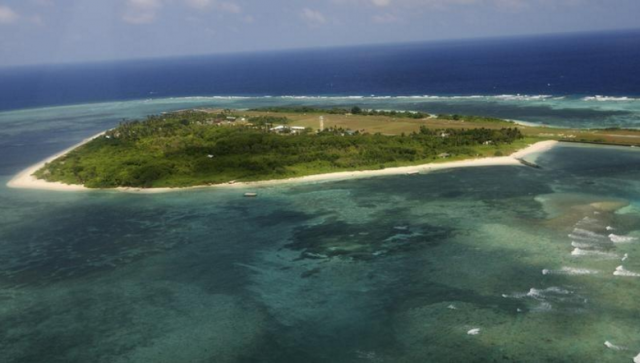
The “Welcome to China” and “Welcome to Vietnam” messages received by reporters and officials who visited Pag-asa island on Tuesday were a matter of mixed cellular signals from China and Vietnam.
Reports said top defense officials brought local reporters to the Philippines-occupied Pag-asa island, which was being claimed by China, Vietnam and Taiwan, as they inaugurated the Philippine Navy’s beaching ramp or pier for their ships to dock.
Defense Secretary Delfin Lorenzana, Armed Forces Chief of Staff Felimon Santos Jr., Navy Flag Officer-in-Command Vice Admiral Giovanni Bacordo, Air Force chief Lt. Gen. Allen Paredes, Army Chief Lt. Gen. Gilbert Gapay, and newly installed AFP Western Command chief Lt. Gen. Erickson Gloria were part of the blessing and the ribbon-cutting ceremony.
However, during the event, news teams, including Lorenzana, received text messages, greeting them with either “Welcome to Vietnam” or “Welcome to China.” They also prompted them to subscribe to a roaming data plan.
Roaming refers to the use of mobile phones outside of its home network to another foreign one.
Lorenzana reportedly dismissed the messages as amusing and then suggested that the country should also put up powerful cell sites in the vicinity.
When asked about the roaming alerts, Smart/PLDT Communications spokesperson Ramon Isberto told reporters that their cell site on the island is down.
The cellular signals that reached reporters and defense officials might have come from the cell sites that China and Vietnam have built more than a decade ago.
“I don’t know exactly how they’re doing it, but there are technical things that can be done. The fact of the matter is those cellular operators have a signal in that area,” Isberto said.
He further explained that even if the cell site was operational, users may still receive these prompt texts, citing the cellphones’ “positioning.”
“It’s a question of the positioning of your cell phone kung nasaan ka relative to the different cell sites. Kasi kung mas malakas ‘yung signal ng isa, mas malapit ka kasi doon, your phone would pick up that signal,” he said.
Isberto also admitted that the island’s remote location made it difficult for them to maintain a cell site.
He assured that the PLDT aims to restore its signal in that location by the end of the week.
More questions
Some Filipinos expressed alarm when reports of the “Welcome to China” greeting reached social media, mostly noting that the area is part of the country’s territory.
Sen. Risa Hontiveros was among those who criticized China for such a greeting despite the incident being a technical issue in cellular signals.
“Huwag tayong magsawang manawagan: #AtinAngPinas! China: leave and pay Filipinos at least P200 billion in reparations for your adventurism in the West Philippine Sea,” Hontiveros said on Facebook.
She then invited the public for an online rally on June 12 or Independence Day via the platform.
“Filipinos will not cower before China. Filipinos will not back down. Sa manlulupig, di tayo pasisiil. Sama-sama tayo sa Biyernes!” she said.
Huwag tayong magsawang manawagan: #AtinAngPinas! China: leave & pay Filipinos at least P200B in reparation for your…
Posted by Senator Risa Hontiveros on Tuesday, June 9, 2020
One Twitter user, meanwhile, questioned why Lorenzana was not bothered by the roaming message from China.
“Lorenzana was on Pag-asa Island for the inauguration, and Welcome to China is the roaming message to anyone who gets on that island. Lorenzana didn’t mind?” the user said.
I don’t get it. Lorenzana was on Pag-asa Island for the inauguration, and Welcome to China is the roaming message to anyone who gets on that island. Lorenzana didn’t mind? pic.twitter.com/BI8zi2rS66
— Fratello (@papalbadass) June 9, 2020
There had been several cases of alleged Chinese propaganda and invasion in the form of a movie, a music video and recently, a geotag on Facebook and Instagram, all of which earned backlash from Filipinos.
Last May, some Filipinos noticed that a geotag identified the Philippines and some parts of the country as a “Province of China.”
They immediately launched a mass report of this geotag option to completely remove these on social media platforms.
Earlier, a two-year-old radio program called “Wow China” also sparked outrage despite the segment being aired on state-run Radyo Pilipinas for over two years now.









